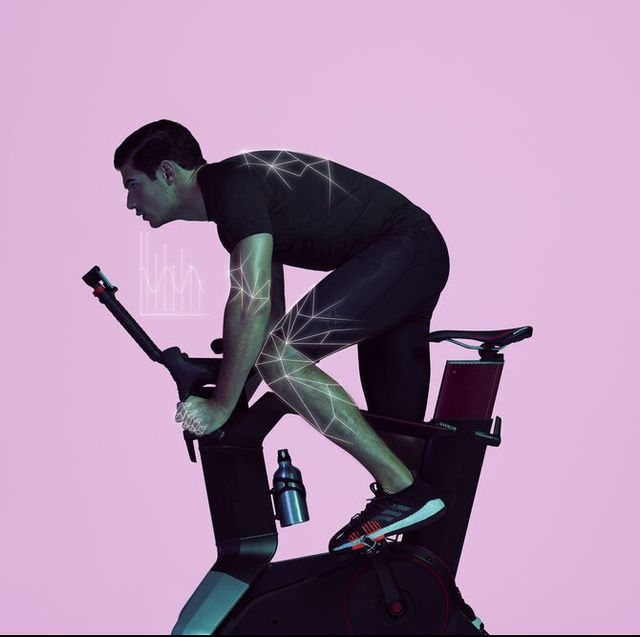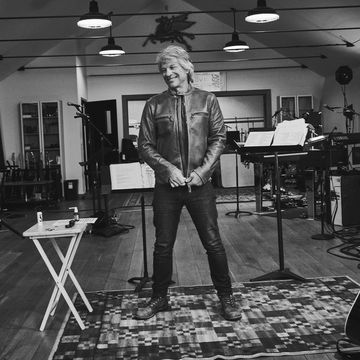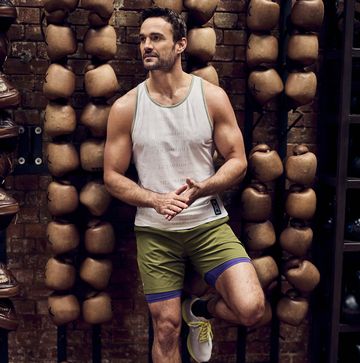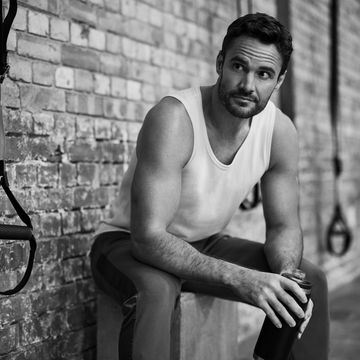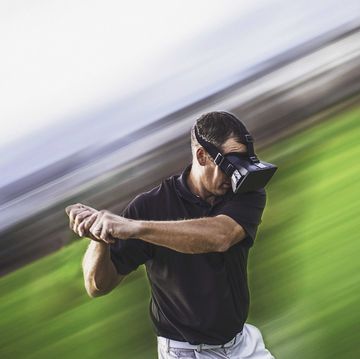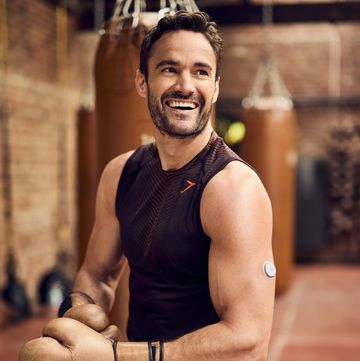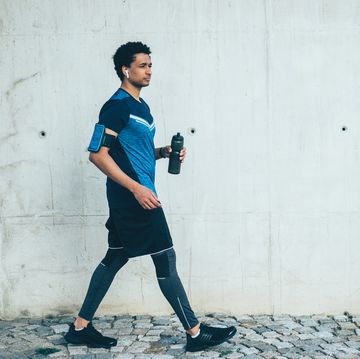Trying to predict the future is a mug’s game, as sci-fi author Douglas Adams famously wrote. But, as he also clarified, it’s a game we must all play because the world is changing so fast. So fast, in fact, that we’ll be living in the future soon, and ‘probably next week’. Fortunately, MH has improved the odds by recruiting a team of fit soothsayers. These are the health and fitness trends experts predict will transform your training in 2022.
1. You’ll train with a new split
Rumours of the gym’s death from Covid complications have been greatly exaggerated, says Les Mills’ CEO, Clive Ormerod. In fact, fitness facilities are enjoying a “live revival”, with David Lloyd surpassing pre-pandemic membership levels and Pure Gym, the Gym Group and Third Space all posting healthy earnings. Streaming’s not going anywhere though, so dual memberships and class packages will facilitate the new normal hybrid of remote and office work, says United Fitness Brands’ chief brand officer, Kris Pace. He’s already seeing reduced in-studio attendance on Mondays and Fridays as more people work from home – where they can continue to train now almost every gym has on-demand video workouts and an app.
2. Every workout will be an event
In Les Mills’ 2021 Global Report, over two-thirds of gym members preferred working out in groups, with live classes almost twice as popular as live streams. “Immersive, interactive and mass participation will return in force as people seek to work out together, away from a screen, bringing the theatre back to fitness,” says Barry’s UK co-founder, Sandy Macaskill. But the “eventicising” of fitness won’t be restricted to IRL, says WellToDo’s Senior Editor, Laura Hill, as operators integrate concepts from sport, music, films and gaming into “heightened, multi-faceted experiences”, AKA glorified workouts from Zwift’s Virtual Tour de France to Peloton’s team-up with Timbaland and Swizz Beatz’ music battle platform Verzuz.
3. Trainers will be the stars of the show
Certain people in particular are drawing us out of social isolation and back into gyms. “Rock-star instructors” came out of Les Mills’ 2021 Global Report as the single most important factor for gym goers in choosing a class - more so than the type of class (or music). The reach and strange intimacy of streaming meanwhile is taking the celebrification of trainers, with their own audiences, agents and merch, to a new level.
Vanity Fair has hailed Peloton’s instructors as “a new class of celebrities, beamed into the homes we can’t leave”: one, former Katy Perry backing dancer Cody Rigsby, is now famous enough to be a contestant on stateside Strictly equivalent Dancing With The Stars.
4. Wellness will be music to your ears
“One of the fastest-growing music platforms is a bike,” says Beth McGroarty of the Global Wellness Institute. Through their deals with Peloton, Beyoncé and Billie Eilish reach millions daily, while the need for high production values means Headspace and Calm are essentially “wellness record labels”. Music isn’t just a soundtrack to workouts but a tool to focus, de-stress and sleep – even a form of therapy at one California hospital. Big streaming music players Apple, Spotify and Amazon are amping up their feel-good offerings. App Endel creates a “personalised soundscape” based on your biometric data and needs; Lumenate takes you on a “trip” with sound and light – no trendy psychedelics required.
5. You’ll come out swinging
Post-lockdowns, “a good walk spoiled” doesn’t sound so bad. So maybe it’s not so surprising that golf is experiencing an upswing - and among a younger demographic. Since the start of the pandemic, the average age of golfers has decreased by five years, while the UK pay-and-play market is dominated by those between 24 and 34, says the Future Laboratory’s Foresight Editor, Kathryn Bishop, while tennis is another previously stuffy “hobby sport” that’s becoming newly fashionable. Luxury menswear e-tailer Mr Porter recently launched a golf range while the newly opened Alex Eagle Sporting Club in London’s Soho serves up tennis style and classes as well as lessons in active pastimes from fencing to gardening.
6. Posture will have more of a bearing
Seven in 10 converts to remote working are suffering more aches and pains, Nuffield Health has found. And that musculoskeletal toll will align with an uptick in yoga, Pilates and plain old stretching. (MH recommends GMB Fitness’ 20-minute daily joint mobility routine on YouTube.) Online yoga, Pilates and barre classes are soaring, says United Fitness Brands’ Pace: yes, attendance is 90% female, but 20 men in a barre class “isn’t to be sniffed at”. Co-founded by an orthopaedic surgeon and supported by studies, label Forme makes surprisingly stylish posture-wear with hidden “tension bands” to pull your shoulders back and down so you stand (or sit) taller.
7. Pic’n’mix fitness will sweeten the deal
From Virgin Active adding aqua-bag boxing classes to boutique 1Rebel’s umpteen “concepts” and the ever-expanding ecosystem of Peloton, fitness operators are trying to be more things to more people.
“I think this is the way the industry is moving,” says Pace of United Fitness Brands, which plans this year to add more businesses to its portfolio of KOBOX, Boom Cycle and Barrecorre, plus launch a universal membership so you can book into any and all. “The major players are all trying to diversify their offering and capture as big an audience as possible.” The key, he says, is to be “brilliant” at what they do - all of it. But if not, you can just do something else.
8. You’ll mix business and athleisure
Work and working out are blurring, says Les Mills’ Ormerod, as employers recognise the performance benefits of physical activity and employees flock to organisations with the best fitness perks. Such incentives are “more important than ever” in order to get employees to actually come into the office, says Barry’s Macaskill, who has seen more companies hiring studios for private team-building classes instead of putting a card behind the bar. Creating a connection is, says the Global Wellness Institute’s McGroarty among the “crucial new challenges” of hybrid working. Businesses are embracing digital solutions from Peloton to Calm, who in turn are “going hard” after the corporate market.
9. You’ll get back to nature
With 90% of our time spent indoors, not always willingly, the market for “harnessing and repackaging” the benefits of the great outdoors is growing, says The Future Laboratory’s Bishop. Some doctors in the US literally prescribe nature, while app NatureQuant measures your scientifically recommended 120-minute weekly dose. In this flourishing “nature economy”, says the Global Wellness Institute’s McGroarty, hospitality openings are trading on awe-inducing natural experiences (forest bathing, wild swimming, ice hiking) and luxury “landscape hotels” are springing up (Spain’s Vivood, France’s Hotel 48 Nord). Rooted in place? Tree.fm brings you soothing forest sounds.
10. Sharing will be self-caring
Two years of intermittently closed public facilities have opened up a booming “wellness sharing economy” of platforms for renting private spaces, says the Global Wellness Institute’s McGroarty – which provides health benefits to the hirers and financial ones to the owners. The “Airbnb of backyard pools” currently available in the US, Canada and Australia, Swimply is launching Joyspace for tennis and basketball courts, home gyms and studios, and even boats. Sites Campspace, Hipcamp and Glamping Hub grant access to tents, yurts, teepees, RVs, cabins and treehouses; app Spinlister links you up with bikes, surf and snow gear wherever you are in the world - so no need to pack yours.
11. You’ll track more than fitness
The “quantified self” movement continues to advance. WellToDo Global’s Hill is keeping an eye on continuous blood glucose monitors such as Levels, Supersapiens – which counts Team GB Cycling director Dave Brailsford as an advisor – and Veri, as the applications extend from diabetics to athletes and biohackers. The vape-like Lumen - endorsed by Tour de France winner Chris Froome - determines from the CO2 in your breath whether you’re metabolising carbs or fat, the right macros for your goals and if you’re sufficiently fuelled to train. And hipster home piss test Vessel reveals your pH, cortisol and, yes, hydration by urinating on then (carefully) scanning QR-coded cards.
12. You’ll hire a wellness coach
That’s not code for “snake oil salesman”. Getting people to stick with lifestyle changes long-term is, says the Global Wellness Institute’s McGroarty, the real trick in both healthcare and wellness - yet both typically operate more like a revolving door. Which is where (legit) wellness coaches come in, with motivational psychology, empathy and time to keep clients on track.
US insurers are already paying for wellness coaches, shown by one study to cut patients’ monthly healthcare costs by $412. Weight management app Noom, now broadening its remit to stress in the US, is one of many to combine cognitive behavioural therapy tech with access to human coaches (over 3,000).
13. Health and wellness will be one and the same
Once combative, the two will increasingly converge, says the Global Wellness Institute’s McGroarty. “Sterile” healthcare will style itself after “cooler, more aspirational” wellness, which will borrow the former’s scientific cred: probiotic purveyor Seed has an advisory board of academic researchers and a one-hour “University” course to prevent affiliates spreading #fakescience on social. “The era of Goop is so 2019,” says McGroarty. CrossFit has launched a Precision Care health programme including blood tests, genetic analysis and (CrossFit-trained) doctor consultations.
14. Affirmative action will speak louder
Signalling virtue isn’t good enough: brands that nailed their colours to the mast during Black Lives Matter and put up a rainbow for Pride “need to demonstrate that this is more than a flash in the pan but a longer-term commitment to taking positive steps all year round”, says Macaskill of Barry’s, which gives instructors “respect and dignity training” to communicate more sensitively and disadvantaged young adults a bursary to become instructors. As part of its agenda to be more “human”, “well”, and “planet”, Lululemon is launching a Center for Social Impact to advocate for those most affected by systemic inequity, while Adidas is supporting LGBT+ football club Stonewall FC.
15. You’ll sleep on the latest innovations
The pandemic has only compounded the “sleep-loss epidemic”, says WellToDo Global’s Hill. And with vitamin ZZZ firmly embedded “at the forefront of performance thinking”, says Damian Soong, co-founder of Form Nutrition, ever more of our waking hours are being dedicated to optimising our comatose ones. While sleep trackers such as the WHOOP strap and Oura ring upgrade their features, the new tech dream is smart mattresses. Now available in the UK, Eight Sleep’s Pod Pro uses a water-heated and -cooled topper (not unlike the Tim Ferriss-endorsed Chilisleep Cube, compatible with any mattress) to set your bed to your desired temperature with a different setting for each shuteye stage - and your partner’s side.
16. You’ll enjoy healthy competition
All your eventicised workouts will be working towards an actual event, whether a full-scale “fitness festival” or just a throwdown at your local gym. “More people than ever will be competing in some capacity,” says MH’s Fitness Editor, Andrew Tracey.
Having notably included a larger man and older woman demonstrating scaled WODs on the livestream of last year’s Games, an attempt perhaps to show that the sport of fitness isn’t just for the elite, CrossFit faces competition from inclusive rivals such as National Fitness Games and Hyrox. “Designed for everybody” (even if they won’t all make the World Championship), Hyrox events can host up to 3,000 participants of all levels, all doing the same workout.
17. You’ll dress a little more smartly
And not just because you might have to go into the office occasionally. Intelligent apparel is “the next frontier in conscious performance training”, says the Future Laboratory’s Bishop. Unveiling in January, UK brand Prevayl is at the cutting edge of the “smart clothing revolution” with quite literally wearables that don’t just look fancy but, via sensors connected by invisible stainless-steel threads, also gather data from your body in greater quantity, depth and accuracy than conventional trackers: core temperature, type of breathing (thoracic or diaphragmatic), electrocardiogram. US start-up Asensei weaves motion capture tech into “connected coaching” kit that counts reps and corrects form.
18. Not all health clubs will be gyms
While some businesses are hurriedly upgrading their in-office fitness facilities, others are turning to purpose-built, wellness-led workspaces in order to attract and retain staff, get them together and give them flexibility to work from nearer home (plus reduce real estate liabilities). The Office Group has partnerships with slick fitness operators such as Manor and Blok for its over 50 natural light- and plant-filled buildings located in London, Bristol, Leeds and, perhaps less near home, Germany. Until near the capital’s Tottenham Court Road is the first workspace and members’ club of 15 planned across Europe and the US for (often self-employed) health and fitness professionals to “sweatwork”.
19. Men will be more positive about their bodies
“It’s not helpful and it doesn’t feel good.” Actor Jonah Hill kindly asking his Instagram followers to not comment on his body felt like a big moment in the male body-positivity movement, backed up by the Campaign Against Living Miserably’s research with Instagram showing that body image has hurt the mental health of half of men aged 16 to 40. Plus, MH’s own survey revealed that 86% of us think we’re under as much appearance pressure as women. We’ve not had to endure it as long, but we’re also not used to calling it out.
20. Supplements won’t just be an add-on
With Brits forecast by analytics firm GlobalData to spend an average of £500 next year on supplements, they’re an unshakable part of modern life. Form, Bulk and Abnormal are vying for a piece of Huel’s powdered meal replacement pie, with the emphasis on nutrition and convenience rather than trying to slim fast. Personalisation à la Abnormal is also popping, with Bioniq and Vitl bespoking supps for your individual needs from consultations, blood tests and DNA. Market researchers Mintel expect lingering immunity concerns to drive consumption of botanical “boosters” such as ginger and mushrooms, while mental health worries will put magnesium and L-theanine front of mind.

Jamie Millar is a freelance journalist and regular Men’s Health contributor, writing about style, grooming, fitness and culture. Follow @mrjamiemillar
